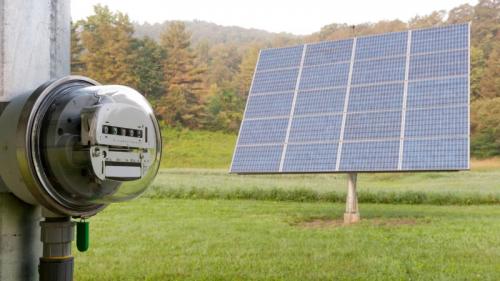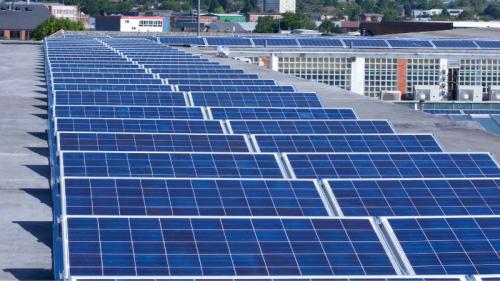What are the Economic Benefits of a Grid Tied Solar System?

As the world continuously advances towards a more sustainable future, the adoption of renewable energy resources becomes critical in the fight against climate change. A particularly appealing solution that has gained significant traction is the grid tied solar system. It is not only an environmentally friendly alternative to conventional energy sources but also offers remarkable economic benefits that could redefine the way we consume energy.
The findings, as per Energies, revealed that for the first time that North American citizens financially build home PV+HP systems to meet all of their electric and heating demands. They received returns of up to 1.9% in the U.S. and 2.7% in Canada. Even if the PV capacities are less than halved, returns on PV-only systems are better, reaching up to 4.3%.
This article will look into the many economic advantages a grid tied system provides, thereby encouraging a shift towards a more sustainable and economically beneficial energy solution.
Understanding the Grid Tied Solar System
Before going into the potential financial upsides of a solar power system that is connected to the grid, it is necessary to have an understanding of what is involved. According to what its name indicates, a grid tied system is one that is connected to the primary power grid. When solar panels generate increased electricity than a house needs, the additional energy is sent back into the grid.
On the other hand, when there is a shortage of power, the grid will still provide the residence with electricity, so there will always be a steady supply. Now, let’s learn some of the major benefits of using a grid tied solar system for homeowners.
The Financial Incentives of a Grid Tied Solar System
One of the most alluring and financially beneficial aspects of a solar power system that is connected to the grid is the possibility of cost reductions. Homeowners have the opportunity to receive a credit on their monthly energy bills if they are able to return surplus electricity to the grid.
The procedure, which is known as net metering, makes it possible for the solar system to, in essence, pay for itself over the course of its lifetime. Furthermore, in certain jurisdictions, additional incentives like as tax credits and rebates further cut the system's initial costs, making it an increasingly appealing investment option. This is because these incentives bring the total cost of ownership down to a lower level.
Reducing Energy Costs
Adding solar panels to existing system can substantially lower energy costs. As a grid tied system often produces more energy than a home requires, especially during peak sunshine hours, homeowners essentially become their own energy providers. This significantly reduces reliance on the grid, leading to lower energy bills. Moreover, even on cloudy days or at night, the system can draw on the excess power it fed into the grid during peak times, maintaining a consistent energy supply without additional costs.
Stabilizing Energy Prices
With a grid tied system, homeowners gain control over their energy production, thereby insulating themselves from the volatility of traditional energy prices. Fossil fuel-based energy sources are prone to significant price fluctuations due to geopolitical dynamics, supply chain disruptions, and other factors. However, once installed, a grid tied system's operating costs are relatively stable, primarily dependent only on the consistency of sunlight.
Increasing Property Value
Property value enhancement is another compelling economic benefit of a grid tied system. It is seen that homes equipped with solar panels tend to sell faster and at higher prices than those without. Buyers are increasingly attracted to the prospect of decreased energy bills and a lower carbon footprint, thereby elevating the market value of homes with grid tied solar systems.
Boosting Job Creation
The installation and maintenance of grid tied solar systems require skilled specialists. As more homeowners adopt this renewable energy solution, it stimulates job creation in the solar industry. These jobs span a range of sectors, from manufacturing and construction to project management and sales, contributing to the overall economic growth.
Living Off the Grid for Beginners: An Alternative Viewpoint
When considering an entirely living off the grid for beginners, it's important to note the trade-offs involved. While living off the grid can bring a sense of self-sufficiency and independence, it also comes with its own set of challenges, such as maintaining energy storage systems and managing energy use meticulously. Above this, a grid tied system offers a more balanced, economically advantageous solution for those beginning their journey towards renewable energy use.
As we strive towards a greener future, it's increasingly important for each of us to consider how we can contribute to this global mission. Investing in a grid tied system is more than a personal or financial decision; it's an investment in the planet's future. By harnessing solar energy, we not only tap into an abundant, renewable energy source but also unleash a slew of economic benefits that can enrich our lives and secure a sustainable future for generations to come.
In the face of a changing energy landscape, it's time to shift the paradigm and embrace solar power. A grid tied system not only offers a pathway towards a cleaner, greener world, but it also paves the way for economic growth and financial stability. From saving on energy bills to increasing property values, the advantages of this renewable energy system are considerable and far-reaching. By adopting a grid tied system, we all can contribute towards a more sustainable and economically resilient world.
Conclusion
In conclusion, the economic benefits of a grid tied solar system are manifold, ranging from reduced energy costs and price stabilization to enhanced property value and job creation. By adopting this renewable energy system, as a homeowner, you can not only lower your carbon footprint but also realize substantial financial gains in the long run.
Moreover, grid tied solar systems provide a practical approach for those exploring the transition from traditional energy sources to renewable ones. As opposed to completely living off the grid, which can be challenging for beginners, a grid tied system allows homeowners to leverage the advantages of solar panel installation. It offers an optimal balance between sustainability and convenience.





Comments